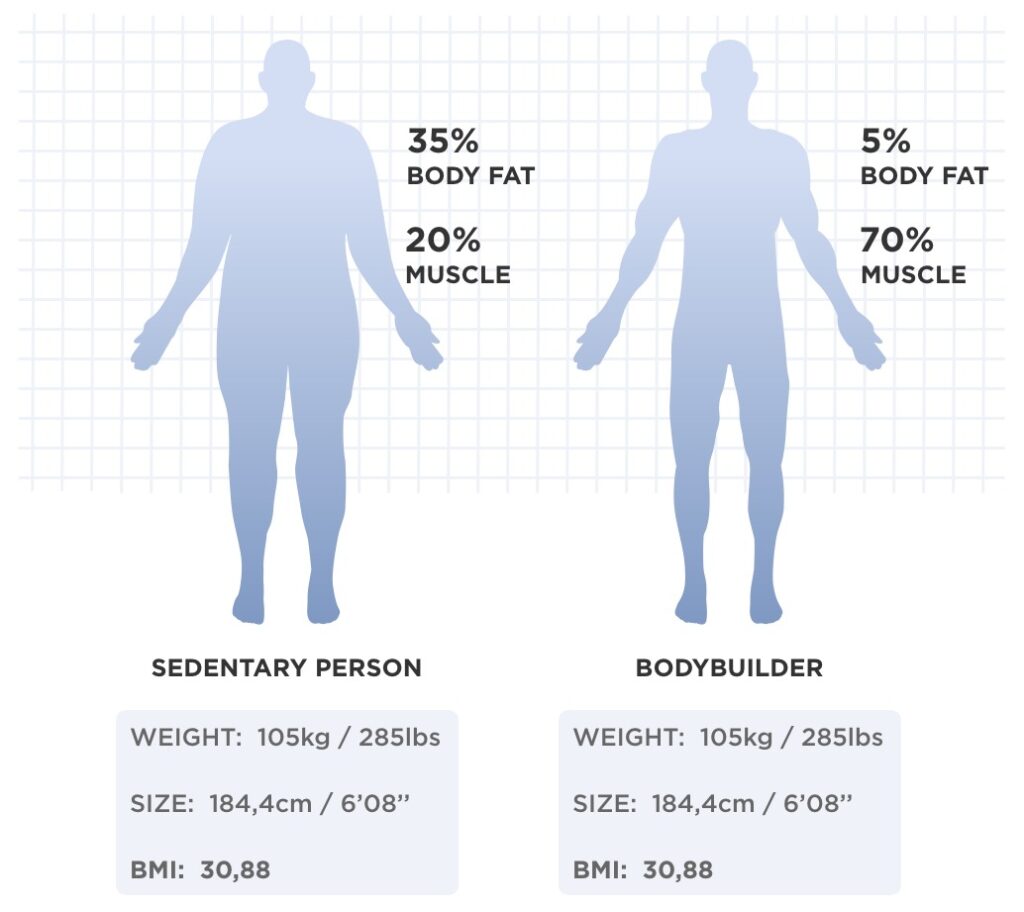I bet you’ve all heard this at least once, but your weight is not an indicator of health, despite what society makes you think. While it’s easy and tempting to focus only on a number on the scale, it’s not the best nor the only indicator of how healthy you are, since weight fluctuates a lot during the day. It doesn’t reflect how many of our systems are doing (lymphatic, digestive, nervous, reproductive, cardiovascular, etc.). There are many other important factors to keep in mind.
Your weight doesn’t show you the full picture of your health. One example of this is that the number that you see on the scale doesn’t specify how much muscle vs fat you have or how much your bones weigh. Muscle weighs twice as much as fat, so if you’re trying to build muscle, you’ll probably notice that the number on the scale goes up as you gain muscle.
Keep reading if you want to know more about other benchmarks that are more important than your weight.

Why is your weight not a good health metric?
Your weight combined with your height (also known as Body Mass Index or BMI) has been the go-to measurement in determining if someone is healthy or not for over one hundred years since its debut in the 1830s. This metric only considers the weight to define if somebody is underweight, normal, overweight, obese, or extremely obese. It doesn’t take into consideration any type of activity the person does or their mental state.
Most of the time, the behaviors or factors behind weight gain (or weight loss) are was is truly detrimental to your health, not the weight itself. This includes behaviours such as poor dieting or a sedentary lifestyle, high-stress levels, bad habits, or any other mental instability, and so on. Besides these factors, there are others like genetics and metabolism that can change the whole shape and weight of your body aside from those habits.
While you shouldn’t rely on the number on the scale, keep in mind that it only tells a very small piece of the story. Instead of checking just your weight, you should also check the following health markers that’ll give you a much more complete overview.
Metrics to measure health instead of weight
The following metrics include but are not limited to blood pressure, cholesterol levels, resting heart rate, and heart rate recovery, among others. You can check many of these measurements at home, but for others, you will need a specific tool such as a smartwatch, fitness tracker, chest strap monitor, or a visit to your doctor for a checkout.
1. Blood pressure
Blood pressure is a measurement of how well your heart pumps blood and oxygen throughout your body. High blood pressure is an indicator that your heart is working too hard to perform these functions.
When someone suffers from high blood pressure, due to the extra pressure, the arteries get harder and the blood vessels weaker. This can put a big strain on the heart and increase the risk of a heart attack, heart disease, heart failure, kidney disease, or stroke.
It usually doesn’t present obvious symptoms until it’s too late. so the best thing you can do is to prevent it by living a healthy life.
How to measure it: To measure it you can go to your nearest pharmacy or to your doctor’s office.
2. Exercise and heart rate
As you may know, your heart doesn’t stay the same throughout the day. It adjusts to match your oxygen consumption. For instance, when you exercise, your body needs more oxygen, so your heart rate speeds ups. The opposite thing happens when you’re resting, your heart rate slows down.
A lower resting heart rate means good health since it means that your heart doesn’t need to overwork to maintain that state of rest. If the opposite happens, high resting heart rate, your chances to suffer a heart attack or other heart issues increase.
A normal resting heart rate is anywhere between 60 and 100 beats per minute. If you’re in really good shape it might be even lower, though.
How to measure it: It is very simple, you just need to find your pulse either on your neck, the inside of your wrist, or even on the top of your foot. Set a timer for 60 seconds and count the total number of beats.

3. Heart rate recovery
Another health marker that has to do with your heart is your heart rate recovery, which means how fast it returns to normal after exercise. Heart rate recovery indicates how good of shape you’re in, if you’re in good shape and work out a lot, you can expect recovery to be fast. It is also correlated with your risk of cardiovascular disease. So, with regular cardiovascular activity, you can improve your heart recovery and your overall health, regardless of your weight.
How to measure it: You’ll need to get your heart rate elevated first, by working out, and then, while you’re still breathing heavily, you’ll set a timer for 60 seconds and count the total number of beats. When the 60 seconds have passed, recover for 2 minutes and then measure it again. Subtract the first number from the second number, and this is your heart rate recovery. A normal heart rate recovery is anywhere between 22 and 52 beats per minute.
4. Cholesterol levels
Cholesterol is a type of fat or lipid that acts as a barrier to protect the cell membranes in your body. It also serves other useful functions like helping you digest foods, producing vitamin D, and making of certain hormones. So, of course, you need enough cholesterol to perform all of these tasks. However, too much of it can cause fatty build-ups on the walls of the arteries that block the passage of oxygen-rich blood which can lead to serious health problems.
When we speak about “bad” cholesterol we’re referring to LDL, but there’s also HDL or what’s known as “good” cholesterol and triglycerides. Most research suggests that by following a ketogenic diet you can lower your LDL cholesterol levels while raising HDL cholesterol levels.
The cholesterol level in adults, in total, should be less than 200, but in this case, the lower the better. That means that to be healthy, your HDL levels should be 40 or higher for men and 50 or higher for women is acceptable. The ideal in both cases is 60. Your LDL cholesterol levels should be less than 100, below 70 if coronary artery disease is present. And your triglycerides level should be less than 149, but the ideal is less than 100.
How to measure it: You must see your doctor and have some blood tests done.
5. Inflammation
Inflammation, just like we’ve seen with cholesterol, is a necessary body function that can sometimes go too far when not controlled.
Inflammation isn’t a process that has been studied enough though. However, it’s a very common factor in autoimmune diseases, heart diseases, and cancer. Inflammation has also been linked to a stress response.
How to reduce it: The best thing to improve inflammation response is to incorporate more anti-inflammatory foods into your daily diet, take daily walks to get your body moving, get better sleep, and meditate to relieve your stress daily.

Other blogs you might like:





Leave a comment
All comments are moderated before being published.
This site is protected by reCAPTCHA and the Google Privacy Policy and Terms of Service apply.